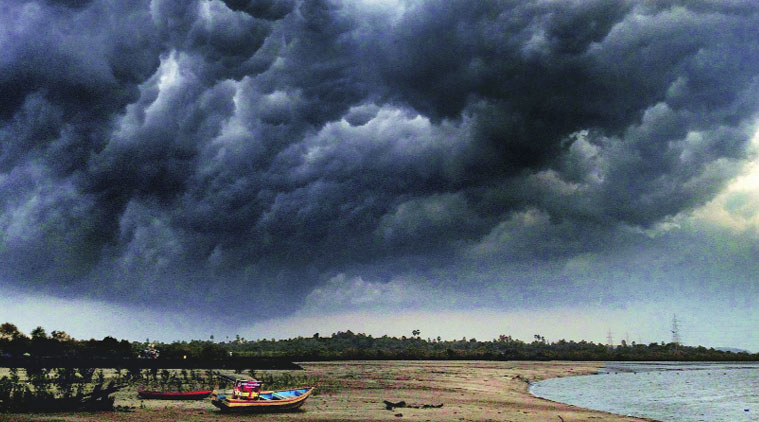Stay updated with the latest - Click here to follow us on Instagram
Cyclonic system over Arabian Sea may head towards India in a few days: IMD
October is a month when seasonal changes occur and is a favourable time for cyclone development, said IMD officials.
 Cyclone Nilofar: IMD has already declared a warning for fishermen against venturing into the sea in the next 24 hours.
Cyclone Nilofar: IMD has already declared a warning for fishermen against venturing into the sea in the next 24 hours.
The unusual rain and winds, and sudden dip in temperature are expected to continue in the city in the coming week as a well-marked low pressure over the Arabian Sea has concentrated into a depression. The system is likely to be declared a cyclonic storm by Monday, said officials from the India Meteorological Department (IMD).
This second cyclone to form in the Arabian Sea this year after cyclone Nanauk coincided with the onset of the southwest monsoon earlier in June will be called ‘Nilofar’, a name contributed by Pakistan.
“The cyclonic system is in the north-westerly direction towards Oman at the moment, but there are chances that the system could recurve and head towards Pakistan and Gujarat by October 30, 31. This would mean intense low pressure and moisture incursion over land,” said K S Hosalikar, deputy director-general of meteorology, IMD Mumbai. “We can expect cloudy skies, isolated rain activity in Mumbai and rough sea in the coming week due to this system,” he said.
IMD has already declared a warning for fishermen against venturing into the sea in the next 24 hours. “Winds will be mainly easterly speed 45-50 kmph temporarily reaching 55 kmph in gusts. Sea will be rough with mainly easterly waves,” read the warning.
October is a month when seasonal changes occur and is a favourable time for cyclone development, said IMD officials.
The city witnessed erratic seasonal changes this year with withdrawing monsoon-related thunderstorms, hottest days in a decade and, then, a sudden lowering of temperature.
The first week of October showed average maximum temperature of around 31 degrees, which shot up to 35 degrees after monsoon withdrew from the city on October 14. Thereafter, the maximum temperature remained as high as 35 degrees Celsius, even reaching the hottest October temperature in a decade at 37.2 degrees Celsius on October 23. Thereafter, the maximum temperature dipped to 29 degrees Celsius on October 25 due to the cyclonic system forming in the Arabian Sea.
“It is a month when seasonal changes are expected. This October, since monsoon withdrawal, the sky was clearer, which meant the temperature went up because of direct exposure to the sun and the easterly winds (from the landside) grew stronger adding to the warmth. And now, there is a low pressure, which has turned into a deep depression and as it intensifies, it has created a moisture blanket over Maharashtra, leading to the isolated rain,” said Hosalikar.
According to IMD, statistically, Arabian Sea is comparatively less prone to cyclones than the Bay of Bengal. “A major factor in the formation of cyclones is the surface sea temperature. Any disturbance in the atmosphere is quickly picked up by a warm sea surface, which is the case in Bay of Bengal as its sea surface temperature is higher than the sea surface temperature of the Arabian Sea,” explained Hosalikar.
“Meanwhile, although unlikely, Mumbai and the state is ready for cyclones,” said V K Rajeev, IMD Mumbai director.
Cyclone watch
According to Cyclone Atlas of IMD, between 2004 to 2013, there were 11 system (cyclonic storms and severe cyclonic storms) in the Arabian sea, of which only six intensified into severe cyclonic storms- the latest one being in 2010 and the maximum being in 2004, which saw three severe cyclonic storms. Most of these systems developed around May-June and September to November months.
In comparison, Bay of Bengal has experienced 25 systems (cyclonic storm and severe cyclonic storm) between 2004-2013. Of these, 13 intensified into severe cyclonic storm, the latest and the highest number being four in 2013.
mumbai.newsline@expressindia.com







